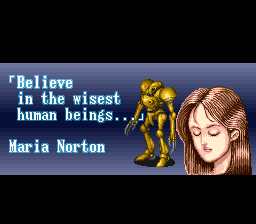The Peace Keepers
| The Peace Keepers |
|---|
|
Also known as: Rushing Beat Shura (JP)
|
The third game in the Rushing Beat series...unless you live in the US, of course, where it's yet another completely unrelated game. Seems Jaleco's US branch just didn't care for consistency.
Contents
Unused Enemies
Spider/Sentry
| To do: Hunt down the pictures of this enemy that appeared in Nintendo Power. |
This mechanical spider enemy was removed from the US version, though it can still be placed in-game via the Pro Action Replay (PAR) code 7E082702. Note that its graphics no longer exist in the game, and it will have a glitchy appearance as a result.
Debug Text
Some leftover text for a debug/test mode exists in the ROM.
At offset 0xA925:
T E S T M O D E
At offset 0xA943:
P L A Y E R 1 P L A Y E R 2 E N M E Y 1 E N M E Y 2 E N M E Y 3 E N M E Y 4
There is a bit of code which copies the "TEST MODE" string into RAM, but it is no longer reachable. There is a pointer table for the remaining text, but it is not referenced anywhere. It is likely that most of the related programming was eventually deleted.
Also, at offset 0xA716:
AREA STAGE
These two text strings are preceded by several RTS instructions in a row, which are remnants of related programming that was later removed. The Japanese version actually has most of these routines intact, though the code that references them was unfortunately removed.
Regional Differences
The US version, on top of having a completely different (made-up) story, removed a lot of lines and the kidnapping of Norton's sister. Prokop has a different head than Jimmy and also has different colors. Bild is white in the Japanese version and black in the US release. Some of the options have different names between versions. In addition, the music is turned off by default; you have to enter the options and manually turn it on, but even then it doesn't have all the music found in the Japanese version. Both games have a color edit mode, but the Japanese version also lets you change the names of characters.
Title Screen
| Japan | US |
|---|---|

|
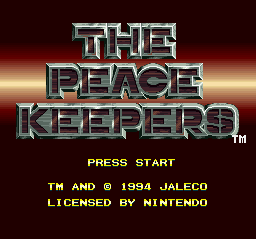
|
Character Names
Norton's name (previously localized as Jack Flak & Hack) remained unchanged
| Japan | US |
|---|---|
| Dick | Flynn |
| Elfin | Echo |
| Kythring | Al |
| Jimmy | Prokop |
| M-Frame | Orbot |
Character Select
The select screen theme in the Japanese version is reused from Brawl Brothers, while the US version is given an original one. They also have totally different character portraits: One other minor change is the fact that player 2's highlighted character faces left in the Japanese version and right in the American version.
| Japan | US |
|---|---|
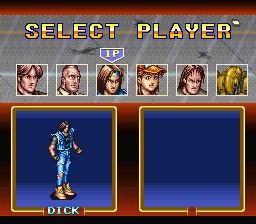 |
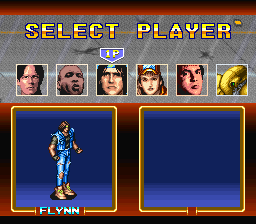 |
Special Moves
The animal-themed special move animations were also changed for seemingly no reason. Notice also that the starting credits were changed from 30 to 12 for the US release.
| Japan | US |
|---|---|
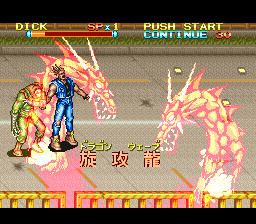 |
 |
| Japan | US |
|---|---|
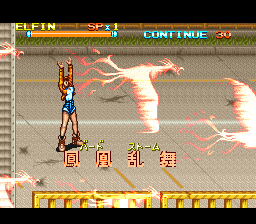 |
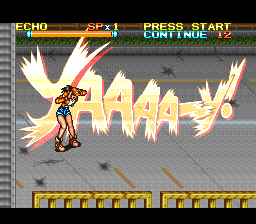 |
| Japan | US |
|---|---|
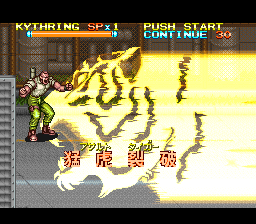 |
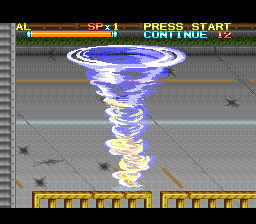 |
| Japan | US |
|---|---|
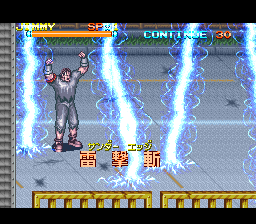 |
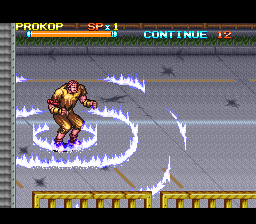 |
Ending
As an example of the hilarious (made up) localization, Echo's bad ending in the US version says she formed a successful musical band with her friend Wendy. The original Japanese ending, which uses the same picture, says that Elfin pursued a new martial arts training under Wendy's tutelage.
| Japan | US |
|---|---|
 |
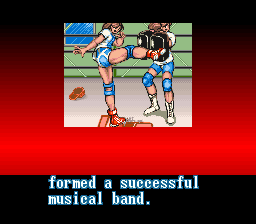 |
Speaking of endings, the US version also removed Maria's letter from the good ending.
The Rushing Beat series
| |
|---|---|
| SNES | Rival Turf! • Brawl Brothers • The Peace Keepers |
- Pages missing developer references
- Games developed by Jaleco
- Pages missing publisher references
- Games published by Jaleco
- SNES games
- Pages missing date references
- Games released in 1993
- Games released in December
- Games released on December 17
- Games with hidden development-related text
- Games with unused enemies
- Games with regional differences
- To do
- Rushing Beat series
Cleanup > Pages missing date references
Cleanup > Pages missing developer references
Cleanup > Pages missing publisher references
Cleanup > To do
Games > Games by content > Games with hidden development-related text
Games > Games by content > Games with regional differences
Games > Games by content > Games with unused enemies
Games > Games by developer > Games developed by Jaleco
Games > Games by platform > SNES games
Games > Games by publisher > Games published by Jaleco
Games > Games by release date > Games released in 1993
Games > Games by release date > Games released in December
Games > Games by release date > Games released in December > Games released on December 17
Games > Games by series > Rushing Beat series
